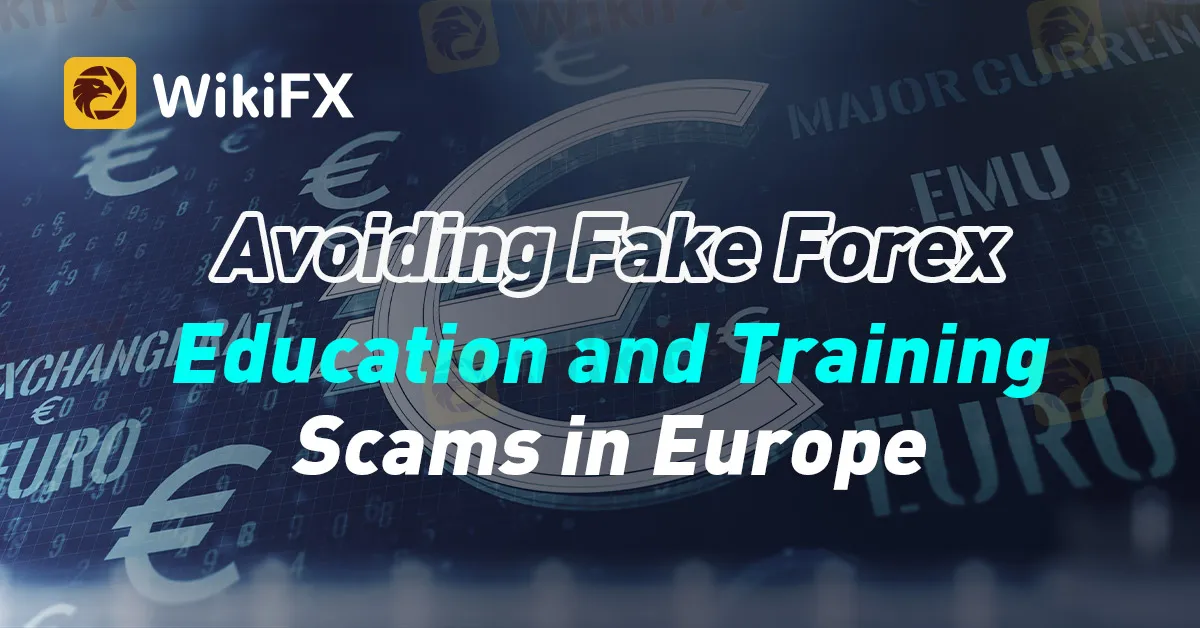简体中文
繁體中文
English
Pусский
日本語
ภาษาไทย
Tiếng Việt
Bahasa Indonesia
Español
हिन्दी
Filippiiniläinen
Français
Deutsch
Português
Türkçe
한국어
العربية
Avoiding Fake Forex Education and Training Scams in Europe
Abstract:Education and training are crucial for traders to develop their skills and succeed in the forex market. However, there are fraudulent entities that offer fake education and training programs, preying on traders' desire for knowledge. In this article, we will discuss how to recognize and avoid fake forex education and training scams in Europe.

Education and training are crucial for traders to develop their skills and succeed in the forex market. However, there are fraudulent entities that offer fake education and training programs, preying on traders' desire for knowledge. In this article, we will discuss how to recognize and avoid fake forex education and training scams in Europe.
Accreditation and Reputation
Genuine education providers often have accreditation from recognized institutions or affiliations with reputable organizations. Verify the credentials and reputation of the education provider before enrolling in any program. Look for reviews and feedback from past students.
Unrealistic Claims
Be cautious of education providers that make extravagant claims about guaranteed profits or quick success. The forex market is complex and requires time, effort, and experience to master. Legitimate providers emphasize realistic expectations and provide a comprehensive education.
Free vs. Paid
While some legitimate providers offer free educational resources, be cautious of entirely free courses that promise to make you an expert trader. Quality education often requires investment. However, research and ensure that the fees are reasonable and commensurate with the value provided.
Course Structure and Content
Evaluate the course structure and content before enrolling. Legitimate providers offer a well-structured curriculum that covers various aspects of forex trading, including risk management and technical analysis. Fake education programs may lack depth or provide outdated information.
Conclusion
Protect yourself from fake forex education and training scams by conducting thorough research, verifying accreditation and reputation, and critically evaluating the course content. For reliable information and resources on forex education, consider visiting WikiFX at www.wikifx.com. They offer comprehensive insights into education providers, helping traders make informed decisions and avoid falling victim to fraudulent schemes.

Disclaimer:
The views in this article only represent the author's personal views, and do not constitute investment advice on this platform. This platform does not guarantee the accuracy, completeness and timeliness of the information in the article, and will not be liable for any loss caused by the use of or reliance on the information in the article.
Read more

Mule Accounts: The Secret Weapon Fake Forex Brokers Use to Dupe Investors
Explore this story where we have highlighted how fake forex brokers use mule accounts to dupe investors.

Fraud Brokers List for July 2025- EXPOSED
Attention investors and traders! If you want to invest in the forex market, be careful not to choose these scam brokers. This warning list is issued by the Financial Conduct Authority.

Know the Major Risks of UbitMarkets, Before You Invest!
Scam brokers involved in the forex market who act genuine in the beginning but turn out to be frauds in the end. Choosing UbitMarkets could lead you to serious losses. Check out this article to know why we’re saying this.

An INR 2.26 Cr Online Forex Trading Scam Busted - Check Out the Details
A major online forex trading scam has been busted by the Cyber Crime Police of the Central Crime Branch (CCB), who have held four people who siphoned INR 2.26 crore from a Chennai-based individual.
WikiFX Broker
Latest News
America's Deficit Reckoning: How the U.S. debt spiral could spark a crisis
Treasury yields hold steady as Trump extends tariff deadline
Gold Prices to Fluctuate This Week Amid July 9 Tariff Deadline, Fed Policy
Top Wall Street analysts are pounding the table on these 3 stocks
Stock futures fall after Trump team says tariffs will go into effect on Aug. 1: Live updates
FCA clarifies expectations on bullying, harassment and violence to deepen trust in financial service
Asia-Pacific markets mixed after Trump shifts goalposts on tariffs again
XS.com Expands Global Reach with Landmark Kuwait Launch
S&P 500 futures fall slightly as Trump threatens new tariffs, Tesla shares drop: Live updates
10 Unlicensed Brokers Exposed – Check Now to Stay Safe!
Currency Calculator


